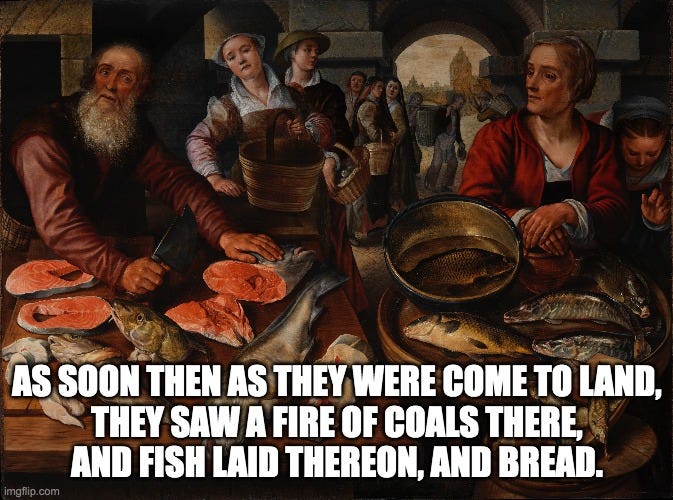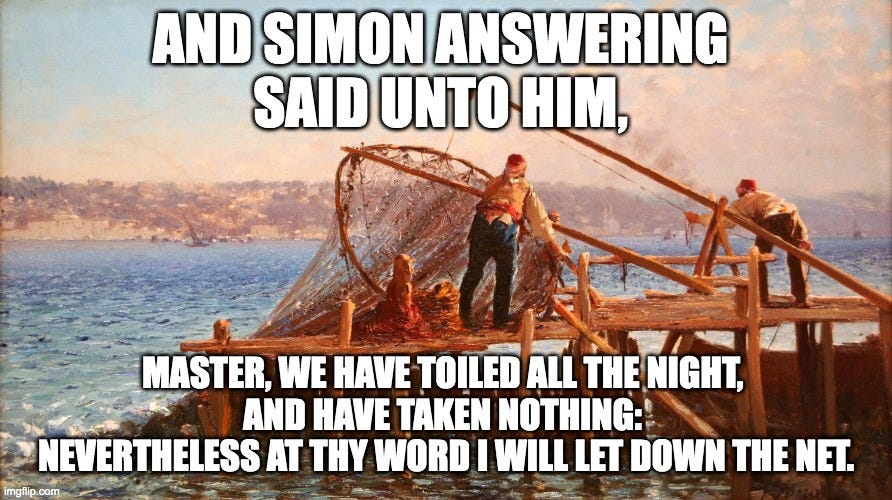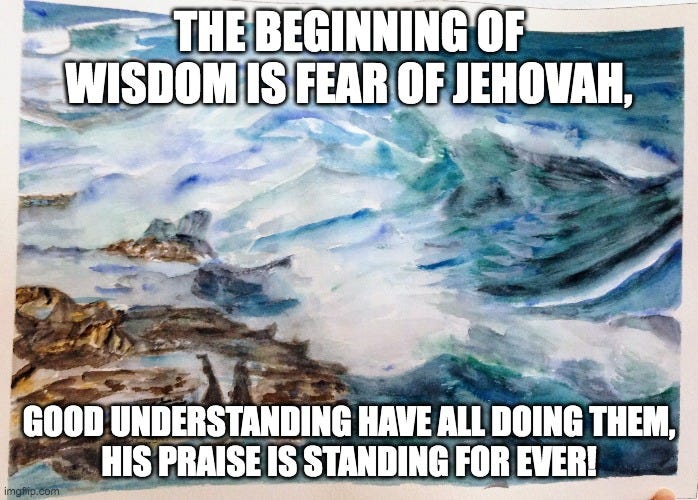The Source of Sushi
Imagine, if you will, that you are dreaming. And in your dream you are standing in a vast restaurant. And directly in front of you is the sushi table… filled with all manner of delicious sushi…
Before you get too hungry, we’re not going to be doing too much eating in this dream. Some, perhaps, but mostly we are going to be looking at a kind of chart, or timeline. We will start with the dream so far. So far we have:
1) A restaurant
2) A table
3) A bunch of sushi on the table.
Now I’m going to make all of those as one point… dropping the restaurant and just making…
- A table filled with Sushi
Now, what comes next? Well, you and I (cause, of course, I’m there too) go and get some sushi…
- A table filled with Sushi
-People take sushi from the table
And then we go off and sit at smaller tables (maybe those kinds where you have to sit cross-legged on the floor. I hope not. I am very bad at sitting cross-legged. Or kneeling) and eat the Sushi…
-A table filled with Sushi
-People take sushi from the table
-People eat the sushi (possibly while kneeling. Irrelevant.)
Now, I am a medical person, but we will end the story there. No need to get into digestion. But the story doesn’t begin there, surely! There must have been waiter type people who brought the sushi to the big table!
-Waiters bring the sushi to the table
-A table filled with Sushi
-People take sushi from the table
-People eat the sushi
And cooks, or whatever you call them, to put the sushi together
-Sushi cooks make the sushi
-Waiters bring the sushi to the table
-A table filled with Sushi
-People take sushi from the table
-People eat the sushi
And truck drivers and purchasing agents…
-The ingredients are bought and brought
-Sushi cooks make the sushi
-Waiters bring the sushi to the table
-A table filled with Sushi
-People take sushi from the table
-People eat the sushi
And fishermen to catch the fish. (I love farmers, but for the purposes of this illustration, we will ignore the rice, sugar, and other ingredients.)
-The fish is caught
-The ingredients are bought and brought
-Sushi cooks make the sushi
-Waiters bring the sushi to the table
-A table filled with Sushi
-People take sushi from the table
-People eat the sushi
And there must be an ocean in which the fish live, and breath, and have their being (and have their little fish which grow up into big fish).
-The fish live in the ocean
-The fish is caught
-The ingredients are bought and brought
-Sushi cooks make the sushi
-Waiters bring the sushi to the table
-A table filled with Sushi
-People take sushi from the table
-People eat the sushi
There! Whew! There’s the chart. So now we can begin to examine… the Source of Sushi!
Intro
Fallible Father has written his next post in our Pizza and Sushi series:
In it, he reveals that we very much are stuck at a particular point in the argument. Not ‘stuck’ as in ‘disagree’ (although no doubt we do) but ‘stuck’ as in ‘aren’t communicating’. Thus, this post, which will concentrate purely on one aspect of his reply:
A side letter came after my last, and Von’s response to it. I was curious at the format, and for once, read the comments (something I advise against, almost always). In there, we find a curious statement:
I don't think so. Indeed I think that gets at the root of what I think we are disagreeing on. I would put it that the terrorist *deliberately rejects what he knows (in his heart) are moral behaviours and deliberately chooses to act in immoral ways.
-Von, In a comment on a side letter from this series
Respectfully, this is the point I am making. We know in our hearts what morality is, and this is able to be articulated without the appeal to God. Perhaps I have explained this poorly, I cannot say; I wrote the words I have written, and understand the intent and thoughts behind them. Maybe they were not as clear as I hoped. God can be used as the reason for morality, but we know in our hearts, and can use this inherent sense of right and wrong to appeal to the better parts of an individual.
Yes, in our hearts, we know. Inherently, we know. This can be turned, or corrupted, but we know. We learn through experience, play (as I have argued), or maybe simply a Divine Being dropped perfection in our hearts and society corrupts us. Either way, we are fallen, and must improve.
These few paragraphs are at, in my opinion, the heart (or, if we are going to continue with the metaphor, the centre) of the difference between us.
The Table
Let me agree with Fallible that we can all see the table. There it is, stretching out in front of us, filled with Sushi. Yes, we all have a sense of morality. A sense organ that measures it. We call it the ‘conscience’. We ignore it, go against it, pervert it… but we all have it.
His last post seems to be focused on this issue: that we agree that there is a conscience in all of us. My plea in this discussion is for him to see that isn’t the end of the discussion; it is the middle. In the list that I provided I started with ‘A table full of sushi’, but I had to work two directions to finish the story. Sushi has to both get to the table, and get eaten.
The Choices
Now, when Fallible and I both get back to our table, I might look at his plate and say, “That’s not sushi! That’s pizza!” Or I might point out that he missed a really great tuna roll or something.1
At that point one of two things can happen. Fallible could look at me, nod, and, his mouth filled with pizza, mumble something about how he likes pizza, and doesn’t like tuna rolls.
Or… he could say that pizza was sushi, and tuna rolls aren’t.
In other words, we could agree on the category ‘sushi’, and he could state that he had decided not to go for all-and-only sushi… or we could disagree as to what is in the category.
So… the table exists. It has sushi on it… but we can still ignore some of the things that are on the table, and get our food from a different table. Morality exists… our conscience exists to tell us about it. But we still end up choosing evil things, and ignoring good things.
The waiters and the cooks and the supply people and the fishermen
One of the issues that has kept coming up in our discussion concerns the various ways that morality is taught and learned. In my metaphor, I portray this as the waiters, cooks, supply people, and fishermen. Now, the metaphor gets messy here (it’s just a metaphor, not reality) as I believe that we arrive at our moral understanding via two different routes. In one sense, it is directly imparted to us by God. The fish leaps right onto the table, as it were. (Sashimi, I suppose :) )
But we also learn morality from others around us. Now, for me, this isn’t at all a problem, as both of these methods are God-ordained and God-supervised. But I’m not sure exactly what Fallible believes here. Do we learn about morality from parents? Authorities? Wise people? Game theory? All of these?
But, anyway, that is this part of my metaphor. The fish exist in the ocean, and they end up on the buffet table. Between these two points are other people and God. Objective morality exists, and we have a conscience. Between those two facts is a huge field of study.
The ocean and the fish
Where I think our disagreement really lies is at sea level. (Oh, come on , didn’t you like that?) At the level of the ocean and the fish.
Because I think that there are at least two different choices as to what the ocean is in our metaphor. Is there really an ocean? Are there real, objective, moral principles? Or is moral understanding all there is? Does sushi originate in the kitchen, the table, or the sea?
If there is a real ocean, with real fish, then all the cooks and fishermen can do is to catch and cook (yes, I know sushi isn’t cooked! What do you call it??) what they are given by the sea. The bounty already provided, that already existed.
And, to stretch the metaphor a bit, if there is a real ocean, with real fish, then all of the fishermen have to fish in the same waters. They don’t get to invent their own little ocean and fish there. Morality has existed since before the beginning of man, and will exist long after we are dead.
If there isn’t an ocean… if there isn’t an objective, external morality… then all we have is our preferences. We dislike cheating, adultery, and murder… others like it. Well, to each their own.
The Purpose of Pizza
(You knew I had to bring in pizza somewhere!)
What is the purpose of pizza? Well, to nourish and taste good. Mostly to taste good. And to form a platform for social interactions. In my experience, at least, pizza is one of the most ‘social’ foods. A ‘personal pizza’ isn’t a contradiction in terms, but it should be :)
Why is it important to deal with the entire chain of morality? Well, what is the purpose of morality? Is morality subjective or objective? Does it merely affect what I choose to do with my life, or is it something I should teach and judge others by?
I have brought up, several times, two particular issues: adultery and child mutilation via transgender propaganda. When we deal with these issues, do we say, ‘It is written,’ or do we say ‘I prefer’? Are we appealing to some objective standard or our own private preference?
I, personally, don’t care if, when we finally get to meet in person, Fallible chooses to eat pizza at the Chinese buffet place. Or, if his budget is greater than mine and he is paying, at some super fancy Japanese sushi house. I might shudder if he gets pizza and his friend orders a hamburger (maybe
came with us. Would Andrew do such a thing???), but I would have no moral objection.But if he tells me that his wife likes to entertain male friends in their bedroom, or that he’s taking his twelve-year-old niece to have her breasts cut off, I’m going to do more than shudder. Because those aren’t in the same category of thing. Those are active evils.
If morality is objective, then it can legitimately sit outside of us and judge. The measuring tape can measure both this board and that one, and determine which is longer. But we don’t trust the sushi chef to tell us that his sushi is better than Marco’s pizza.
Truth
I’m in this discussion for the long haul because I believe there is such a thing as ‘truth’. And that if all morality is, is how you feel about things on a given day, then let us eat, drink, and be merry, for tomorrow we die.
History has shown pretty conclusively that mankind is pretty preoccupied with issues of morality. We have dozens of words that we use to put things on the moral scale: good and evil, right and wrong, chastity and adultery. Hundreds of our most popular proverbs (not to mention the Proverbs) deal with issues of morality, either directly or indirectly.
One of the most fundamental precepts of all morality is that of truth, and one of the easiest ways to fall from morality is by adopting lies. We cannot merely say “I don’t need to appeal to…” if the question is ‘what is real?’ or ‘How does this really work?’.
Conclusion
Getting back to the beginning, I would re-quote this quote:
We know in our hearts what morality is, and this is able to be articulated without the appeal to God.
The point of my timeline chart thing was to illustrate that it isn’t the ‘articulation’ and ‘appeal’ that was the question… but the reality. Certainly, we can go to a Sushi restaurant, even one that also serves pizza (hopefully not with pineapple on it), and we can get our food and have a nice pleasant conversation the entire evening without mentioning fish, or fishermen, or oceans.
But we can’t have sushi without those things. We don’t have to ‘talk about them’. We don’t have to ‘articulate them’ or ‘appeal to them’, but we must ‘have them’. They must exist.
Creating a moral system without an objective external source is impossible. All that could be created were subjective moral ‘feelings’. And we all know that moral ‘feelings’ differ (or, at the very least, the way people talk about them and act on them differ.) Hollywood stars may be into ‘open marriage’ and use all sorts of nice words to talk about it. The rest of us call it ‘adultery’ and shudder. The man in the White House talks about ‘transgender rights’ and ‘gender-affirming care’. The rest of us call it castration and mastectomies and mutilation and perversion.
Links
A Piece of Pi
·
NOV 30
The knowledge of Pizza, Defintion of Sushi, and Existence of Food
·
NOV 16
Pizza, Sushi, and the Definition of Morality
·
OCT 31
Sushi, Pizza, and the Existence of God
·
OCT 24
Ground Rules
·
AUG 9
Quote, Misquote, and Steelman
·
NOV 14
Steelmen and Inconsistencies
·
AUG 2
On colour, colour vision, and breastfeeding
·
JUL 14
I don’t want to clutter the post, but my point here is that we might add to ‘moral things’ things that aren’t at all moral; and we might subtract things that are. In previous posts, this latter category has been addressed both under ‘Honour thy Father’ (Yes,
, thy Mother too) and thankfulness and obedience to God… both of which Fallible does not agree with, despite their being two of the historically most emphasised moral beliefs. And he has added an issue of ‘ choice’ (as in, my children didn’t choose to be born to me), which is notoriously absent from any moral calculus before, say, ten minutes ago.


















C.S. Lewis makes this argument very well in the first few chapters of Mere Christianity, though without appealing to sushi, so maybe he doesn't do as well as you. :-)
I would not order pizza or a burger at a Chinese buffet...
But if it were being served, I may put one on my plate in the midst of the other offerings provided...